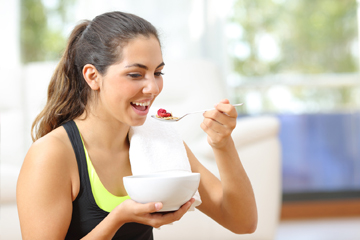Essential nutrients, vitamins and minerals contribute to our overall well-being. However, due to their high activity levels, athletes need more nutrients than less-active or sedentary people. To build an athletic body and keep their energy levels high to beat fatigue and ensure the best performance, athletes need to follow a balanced diet that includes specific vitamins and minerals. These essential nutrients are crucial for a variety of activities in the body such as turning food into energy and keeping bones healthy.
According to the Academy of Nutrition and Dietetics, while some research suggests high activity levels in athletes may increase their vitamin needs, there are no official guidelines for vitamin recommendations specific to athletes at this time. For instance, as athletes lose more electrolytes such as magnesium, potassium and sodium through sweating, they would need more of them. Similarly, they would experience wear and tear due to intense activity which may increase the need for antioxidants such as vitamin E that to protect the muscle cells from oxidative damage. A deficiency of these nutrients can likely will take a toll on an athlete’r performance.
Here are the top seven nutrients essential for athletes:
- Vitamin D: Athletic activity puts a lot of pressure on the bones and joints. Vitamin D is essential for building and maintaining healthy bones. While sunlight is the best natural source of Vitamin D, there are foods rich in Vitamin D like egg yolks, tuna, salmon, soy milk, cheese and so on. If your body isn’t getting enough of Vit D, discuss taking vitamin D supplements with your doctor.
- Omega 3: Omega-3 fatty acids allow the maximal amount of oxygen-rich blood to reach your working muscles (health.clevelandclinic.org). However, as these essential fats is not produced by our bodies, we must obtain them through diet. The best food sources of omega-3 fatty acids are fish (mackerel, salmon, herring and so on), chia seeds, flaxseed, and also dietary supplements such as fish oil.
- Magnesium: This major mineral controls neuromuscular, cardiovascular, immune, and hormonal functioning. If you lack magnesium, it can lead to muscle weakness and fatigue, injury and eveb affect your mental well-being. To get the magnesium you need, eat bananas, figs, avocado and raspberries, nuts and seeds, legumes, seafood and vegetables like peas, broccoli, brussels, sprouts, and green leafy vegetables.
- Vitamin E: Though Vitamin E has no role in improving overall athletic performance, it is an important antioxidant to prevent oxidative cellular damage. Vitamin E helps promote a healthy immune system, thereby reducing the risk of picking up viruses from public spaces. It increases your anaerobic threshold and eases muscle cramps. Good dietary sources of vitamin E include nuts, such as almonds, peanuts and hazelnuts, and vegetable oils, such as sunflower, wheat germ, safflower, corn and soybean oils.
- Vitamin C: This immune-boosting vitamin is essential for athletes training outdoors as it prevents airborne viruses and common colds. Food sources of Vit C include citrus fruits and strawberries, and vegetables like broccoli, cauliflower, and capsicum among others.
- Potassium: An important electrolyte, potassium is an important mineral in your blood, urine, and bodily fluids. It contains an electric charge which helps your cells communicate with each other and gives you the ability to taste, see, smell, touch, and hear. Nearly 70% of the potassium in your body is found in bodily fluids like plasma, blood, and sweat, while the rest is stored in your bones. Sweating heavily during intense exercise can lead to loss of potassium. Low potassium levels can cause muscle cramping and cardiovascular issues along with reducing your energy and endurance. Consume potassium-rich foods such as bananas, citrus fruits, melons, leafy greens, broccoli, fish, meats, milk, sweet potatoes, legumes (lime, kidney beans) each day.
- Iron: One of the major functions of iron is to carry oxygen to the cells in your body, which makes it essential for athletic performance. However, exercise may cause some iron loss or decreased absorption. In fact, iron deficiency is a common problem for athletes and runners, especially in female athletes, endurance athletes and vegetarian athletes Not having enough iron in the body will cause fatigue and impact physical performance. The need for iron may be 30% greater in those who engage in regular intense exercise. Good food sources of iron include clams, turkey breast, fortified breakfast cereals, beef, beans, spinach, and oats.
Make sure that you include these best vitamins and minerals in your diet or as supplements. Along with them include vitamin A, B vitamins, thiamin, niacin, creatine, zinc, sodium and selenium too. A registered dietitian or nutritionist who is specialized in sports nutrition can provide you with an individualized nutrition plan that meets your vitamin and mineral needs.

